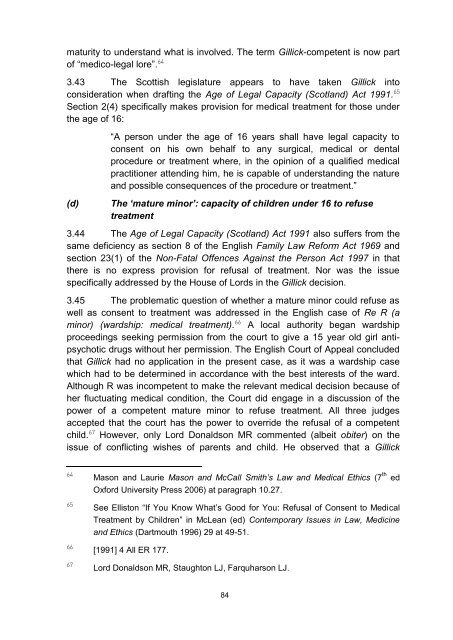Consultation Paper on Bioethics - Law Reform Commission
Consultation Paper on Bioethics - Law Reform Commission
Consultation Paper on Bioethics - Law Reform Commission
Create successful ePaper yourself
Turn your PDF publications into a flip-book with our unique Google optimized e-Paper software.
maturity to understand what is involved. The term Gillick-competent is now part<br />
of “medico-legal lore”. 64<br />
3.43 The Scottish legislature appears to have taken Gillick into<br />
c<strong>on</strong>siderati<strong>on</strong> when drafting the Age of Legal Capacity (Scotland) Act 1991. 65<br />
Secti<strong>on</strong> 2(4) specifically makes provisi<strong>on</strong> for medical treatment for those under<br />
the age of 16:<br />
“A pers<strong>on</strong> under the age of 16 years shall have legal capacity to<br />
c<strong>on</strong>sent <strong>on</strong> his own behalf to any surgical, medical or dental<br />
procedure or treatment where, in the opini<strong>on</strong> of a qualified medical<br />
practiti<strong>on</strong>er attending him, he is capable of understanding the nature<br />
and possible c<strong>on</strong>sequences of the procedure or treatment.”<br />
(d) The ‘mature minor’: capacity of children under 16 to refuse<br />
treatment<br />
3.44 The Age of Legal Capacity (Scotland) Act 1991 also suffers from the<br />
same deficiency as secti<strong>on</strong> 8 of the English Family <strong>Law</strong> <strong>Reform</strong> Act 1969 and<br />
secti<strong>on</strong> 23(1) of the N<strong>on</strong>-Fatal Offences Against the Pers<strong>on</strong> Act 1997 in that<br />
there is no express provisi<strong>on</strong> for refusal of treatment. Nor was the issue<br />
specifically addressed by the House of Lords in the Gillick decisi<strong>on</strong>.<br />
3.45 The problematic questi<strong>on</strong> of whether a mature minor could refuse as<br />
well as c<strong>on</strong>sent to treatment was addressed in the English case of Re R (a<br />
minor) (wardship: medical treatment). 66 A local authority began wardship<br />
proceedings seeking permissi<strong>on</strong> from the court to give a 15 year old girl antipsychotic<br />
drugs without her permissi<strong>on</strong>. The English Court of Appeal c<strong>on</strong>cluded<br />
that Gillick had no applicati<strong>on</strong> in the present case, as it was a wardship case<br />
which had to be determined in accordance with the best interests of the ward.<br />
Although R was incompetent to make the relevant medical decisi<strong>on</strong> because of<br />
her fluctuating medical c<strong>on</strong>diti<strong>on</strong>, the Court did engage in a discussi<strong>on</strong> of the<br />
power of a competent mature minor to refuse treatment. All three judges<br />
accepted that the court has the power to override the refusal of a competent<br />
child. 67 However, <strong>on</strong>ly Lord D<strong>on</strong>alds<strong>on</strong> MR commented (albeit obiter) <strong>on</strong> the<br />
issue of c<strong>on</strong>flicting wishes of parents and child. He observed that a Gillick<br />
64 Mas<strong>on</strong> and Laurie Mas<strong>on</strong> and McCall Smith‟s <strong>Law</strong> and Medical Ethics (7 th ed<br />
Oxford University Press 2006) at paragraph 10.27.<br />
65 See Ellist<strong>on</strong> “If You Know What‟s Good for You: Refusal of C<strong>on</strong>sent to Medical<br />
Treatment by Children” in McLean (ed) C<strong>on</strong>temporary Issues in <strong>Law</strong>, Medicine<br />
and Ethics (Dartmouth 1996) 29 at 49-51.<br />
66 [1991] 4 All ER 177.<br />
67 Lord D<strong>on</strong>alds<strong>on</strong> MR, Staught<strong>on</strong> LJ, Farquhars<strong>on</strong> LJ.<br />
84

















